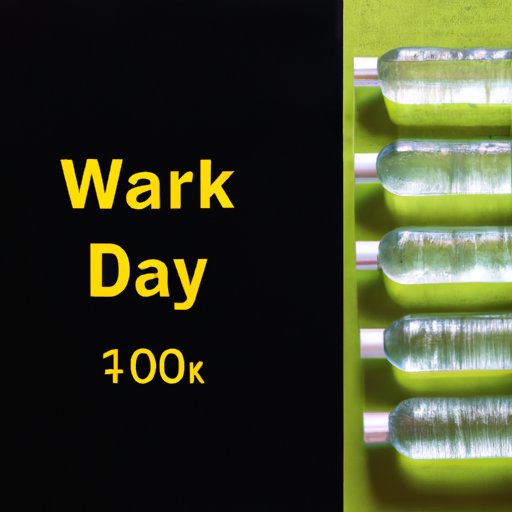
I. Introduction
Water is essential for good health. It helps regulate body temperature, aids digestion, and keeps our skin looking vibrant and healthy. However, many of us struggle to drink enough water each day. In this article, we’ll explore how much water you should drink daily and provide practical tips for meeting your hydration goals.
II. Understanding the Importance of Proper Hydration: How Much Water Should You Drink Daily?
Proper hydration is incredibly important for overall health. Water helps maintain the balance of bodily fluids, which aids in digestion, circulation, and the transportation of nutrients. It also helps regulate body temperature and keeps skin healthy and vibrant.
Despite the importance of hydration, there is no set amount of water that everyone should consume. The recommended daily water intake varies based on a variety of factors, including age, gender, activity level, and health status. However, a general recommendation is to consume eight 8-ounce glasses of water per day, which is around 2 liters or half a gallon.
III. The Science of Optimal Hydration: How Much Water Do You Need Each Day?
The amount of water each individual needs varies based on factors such as body size, activity level, and climate. Dehydration can cause headaches, fatigue, and poor concentration. It can also affect physical performance and contribute to kidney stones and constipation.
Guidelines for determining daily water intake based on individual needs suggest drinking one liter of water for every 25 kilograms of body weight. For example, if someone weighs 68 kilograms, they should drink around 2.7 liters of water per day.
IV. H2O 101: How to Determine How Much Water You Should Be Drinking Daily
There are numerous methods for determining daily water intake, including the 8×8 rule (eight 8-ounce glasses of water per day) or checking urine color. While these methods can provide a baseline, they don’t consider individual factors such as body size and activity level.
Tracking water intake is a helpful way to ensure you’re meeting your daily water intake goals. There are many apps available for tracking water intake, and some water bottles come with markings to help you measure your consumption.
V. The Benefits of Staying Hydrated: Tips for Meeting Your Daily Water Intake
Staying hydrated has numerous benefits. Improved skin appearance, digestion, and athletic performance are just a few of the benefits of proper hydration. Drinking water throughout the day can help ensure you meet your daily water intake goals.
Other tips for staying hydrated include carrying a water bottle with you throughout the day, drinking water with every meal, and choosing water-rich foods such as fruits and vegetables.
VI. The Debate Over How Much Water You Should Drink in a Day: Myth vs. Fact
There are many myths about hydration, such as the idea that everyone should drink eight 8-ounce glasses of water per day. In reality, the amount of water you need varies based on a variety of factors, including age, gender, and activity level.
It’s also important to note that drinking too much water can be harmful. Overhydration can cause nausea, headache, and even lead to water intoxication.
VII. Key Factors That Affect Your Daily Hydration Needs: How Much Water Should You Really Be Drinking?
Age, gender, body size, and health conditions are all factors that affect daily hydration needs. Pregnant or breastfeeding women and athletes typically require more water than the average person. Individuals with medical conditions such as kidney disease may need to limit their water intake.
To adjust daily water intake based on these factors, it’s important to consult with a healthcare professional.
VIII. Meeting Your Body’s Unique Hydration Needs: A Guide to Determining Your Daily Water Intake
Determining your daily water intake needs is an important step in maintaining optimal hydration. Follow the guidelines presented in this article to determine your personalized daily water intake needs.
Remember to track your water intake and choose water-rich foods to help meet your daily water intake goals. Prioritizing hydration can lead to numerous health benefits and help you feel your best.
IX. Conclusion
Proper hydration is essential for overall health and wellness. By following the guidelines presented in this article and tracking your water intake, you can ensure you’re meeting your daily water intake needs. Whether you’re an athlete or just looking to improve your health, staying hydrated should be a top priority.




